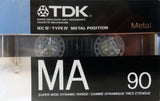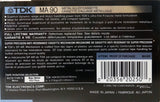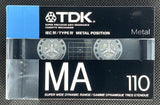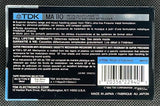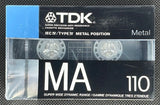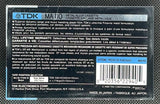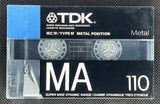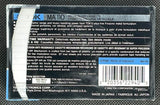TDK MA - 1988 - US
"My favourite version of this legendary cassette, it just looks and sounds superb. Saying that, I think 1988 is my favourite year for TDKs" Tony Villa.
These have come out of plastic sealed master boxes, so they're "boxfresh" and probably the finest on sale if you're buying to collect.
What about the "white powder"? Well, it seems to have affected many of the TDK metals of this era. Many of our samples do show a minor amount of this white powder. Some less, some more.
It's not as bad as some make out. It's not mould. It's dried lubricant. FF/REW these a couple of times in a winder or on your deck (clean the tape path afterwards) and then it disappears. They record as superbly as you would expect.
NOTE 1: 110 Minutes: Box-fresh cassettes. Stock beginning to dwindle. Light to no powder.
NOTE 2: 110 Minutes: B-Grade. Box-fresh cassettes with a 1.0-1.5cm rip each (repaired to avoid further damage). Light to no powder. Only 2 available.
About TDK:
TDK was founded in Tokyo, Japan, on 7 December 1935 to manufacture the iron-based magnetic material ferrite, which had been recently invented by Yogoro Kato and Takeshi Takei.[3] In 1952 and 1957 they began production of magnetic tapes, with compact cassette tapes following in 1966; it is for these that the company is most widely noted. TDK used to manufacture an extensive portfolio of magnetic and optical media, including several formats of videotape and blank CD-R and recordable DVD discs until the recording business was sold to Imation in 2007.
Operations in the USA began in 1965 with a New York City office,[4] and European operations began in 1970 with an office in Frankfurt, West Germany.[5]
Since 1997 TDK has gradually withdrawn from the production of compact cassettes. First with the MA-X and AR ("Acoustic Response"), then the AD ("Acoustic Dynamic") and SA-X line in 2001 and 2002 respectively, then the MA ("Metal Alloy") line in 2004. The SA ("Super Avilyn") and D ("Dynamic") lines were withdrawn in 2012 under Imation ownership. Industry trends see the company moving into new forms of media; in 2004 TDK was the first media manufacturer to join the companies developing BD post-DVD technology.[4] TDK operated a semiconductor division in California for about a decade, but divested it in 2005.
In late 2007, Imation acquired TDK's recording business, including flash media, optical media, magnetic tape, and accessories, for $300 million.[6][7] This also included a license to use the "TDK Life on Record" brand on data storage and audio products[8] for 25 years.[6] In September 2015, Imation announced that it had agreed to relinquish this license[9] and would cease selling TDK-branded products by the end of the year.[10]











